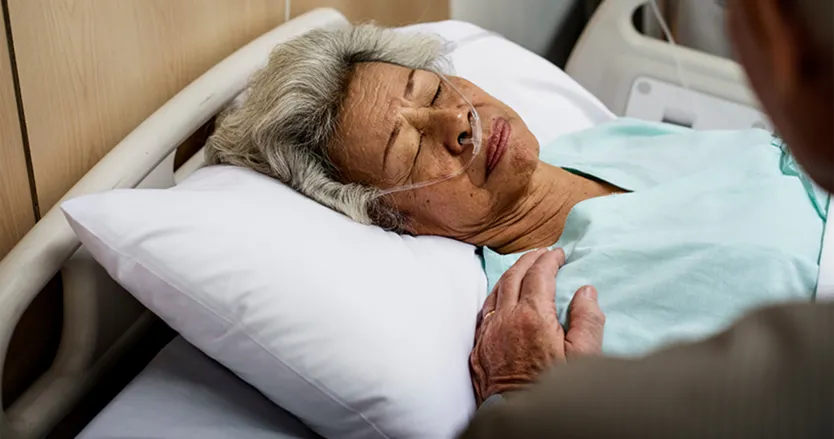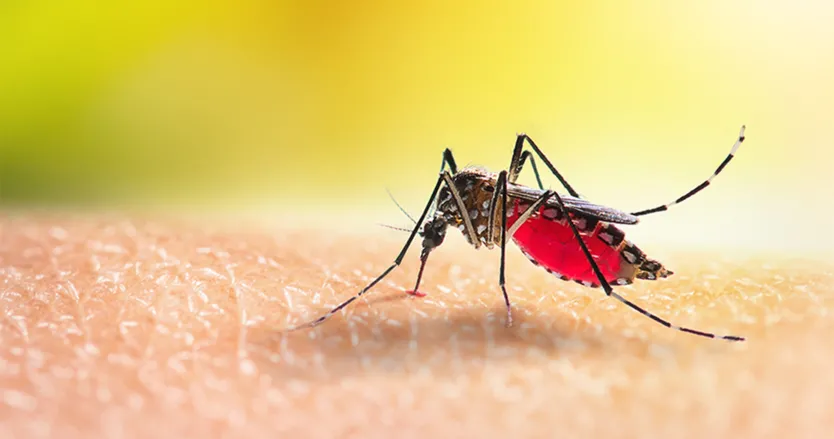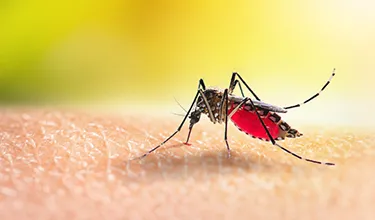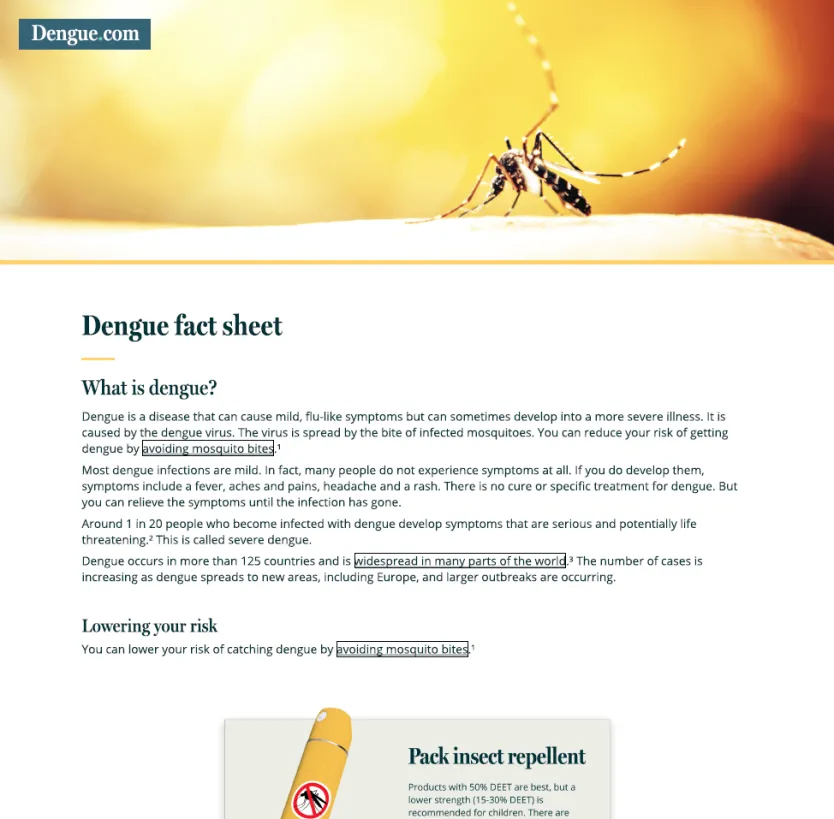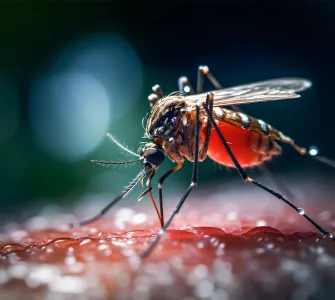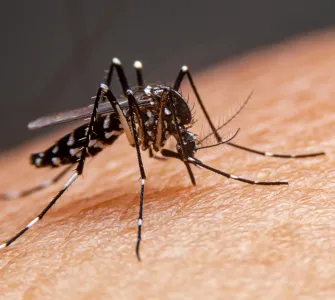Dengue is on the rise worldwide – how much do you know about severe dengue?

Breaking new ground
Dengue is an infection caused by the dengue virus.1 It can be transmitted to humans who are bitten by infected Aedes mosquito species.1 Cases of dengue have been rising globally.1 While this disease thrives in warm and wet climates, it is now spreading to new areas including Europe and North America.1-6 In 2022 alone, the number of locally-acquired dengue infections within the EU was the same as the combined total in the last 11 years.4
The sharp rise in cases within Europe may be partly driven by climate change whereby heatwaves and flooding are becoming more common and severe, and summers are getting longer and hotter.2,4-6 This conspires to create conditions that promote the breeding and spread of Aedes mosquito species.2,4,6
“Dengue is spreading to new areas including Europe, and explosive outbreaks are occurring. Local transmission was reported for the first time in France and Croatia in 2010 and imported cases were detected in 3 other European countries.”
– World Health Organization1
While many dengue cases are mild, it can occasionally be life-threatening
Most dengue infections do not cause any symptoms, or only mild symptoms.1 However, about 1 in 4 people will get sick and experience more serious symptoms like fever, headache and rash.1,7 The majority of people recover within a week or two.1 Of those who get sick with dengue though, around 5% can progress to severe dengue.7 This can be a life-threatening medical emergency needing urgent hospital treatment.3,7 It is estimated that half a million people or so, globally, with severe dengue are admitted to hospital every year.8
Unfortunately, during epidemics, dengue can place severe pressure on healthcare systems. For instance, some hospitals in areas with limited resources may not have enough beds for the spike in patient numbers.5,9
“Severe cases can result in death or require lengthy hospitalization, with potential long-term side effects; clinical dengue cases can overwhelm health care facilities; subclinical infections can limit attendance at work or school; and inapparent infections can act as a reservoir of infection that undermines surveillance and control.”
– World Health Organization10
Knowing how to spot the symptoms of severe dengue may be life-saving
According to the US Centers for Disease Control and Prevention estimates, each year around the world up to 400 million people get infected with dengue, around 100 million people get sick from infection, and 40,000 die from severe dengue.11
During severe dengue, the person’s blood vessels can begin to leak, leading to a dangerous drop in blood pressure (also known as shock). This can mean their organs, such as the heart and kidneys, may stop working properly.3 It is vital to recognize the signs of severe dengue and get help right away as a delay in medical care can lead to death.7
What are some signs of severe dengue?
While the same signs may not occur in everyone, there are some things which could suggest a severe dengue infection. These signs can include severe stomach pain, vomiting, difficulty breathing, or blood in your nose, gums, vomit, or stools.1,3 It is also important to consider the timing of the signs – warning signs of severe dengue begin around one or two days after the initial fever begins to subside.3
Signs of severe dengue include3
Severe pain in the tummy
Persistent vomiting
Fast breathing
Bleeding gums
Feeling extremely tired
Feeling restless
Blood in your vomit
Dengue can linger
The story doesn’t always end when patients leave hospital. Even after hospitalization, dengue can linger on. Some dengue patients can have persistent symptoms such as fatigue, depression, and weight loss after the recovery phase.12
Could you be at a higher risk of severe dengue than others?
Living in, or traveling to, an area where there is dengue makes you vulnerable to infection. The risk of developing severe dengue can be higher for some people, such as those who have been infected with dengue before.7 Explore this section to find out more about if you or your loved ones are at a higher risk of severe dengue and the steps to take if this is the case.
References
World Health Organization. Available at: https://www.who.int/news-room/fact-sheets/detail/dengue-and-severe-dengue Accessed December 2023.
Naish S, et al. BMC Infect Dis. 2014;14:167.
Mayo Clinic. Dengue Fever. Available at: https://www.mayoclinic.org/diseases-conditions/dengue-fever/symptoms-causes/syc-20353078 Accessed December 2023.
European Centre for Disease Prevention and Control. Available at: https://www.ecdc.europa.eu/en/news-events/increasing-risk-mosquito-borne-diseases-eueea-following-spread-aedes-species Accessed December 2023.
Dengue Alliance. Lancet Glob Health. 2023;31:S2214-109X(23)00362-5. Epub ahead of print.
Filho WL, et al. Int J Environ Res Public Health. 2019;16(24):5114.
Centers For Disease Control and Prevention. Available at: https://www.cdc.gov/dengue/hcp/clinical-signs Accessed December 2023.
Kan FK, et al. Clin Infect Dis. 2020;70(11):2247-2255.
Taylor L. BMJ. 2023;381:1431.
World Health Organization. Available at: https://www.who.int/activities/improving-data-for-dengue. Accessed December 2023.
Centers for Disease Control and Prevention. Available at: https://www.cdc.gov/dengue/about/index.html. Accessed December 2023.
Tiga DC, et al. Am J Trop Med Hyg. 2016;94(5):1085-1089.


















